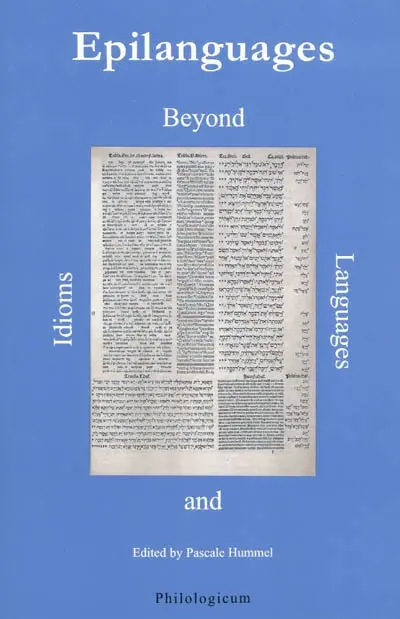en savoir plus

Permet à tous ses détenteurs d'obtenir 5% de réduction sur tous les livres lors du retrait en magasin (réduction non cumulable avec les réductions de type étudiant).
Offre également un certain nombre d'avantages auprès de nos partenaires.
Avec les favoris, retrouvez dans un espace les sélections effectuées au fur et à mesure de vos navigations dans le site.
Constituez pour votre usage personnel vos listes de livres en prévisions d'achats futurs et votre sélection d'articles, dossiers, événements, vidéos ou podcasts préférés ou à découvrir plus tard...
Il suffit simplement de cliquer sur "Ajout Favori" sur chaque page qui vous intéresse pour les retrouver ensuite dans votre espace personnel.
Requiert un compte Mollat
Requiert un compte Mollat
Epilanguages : beyond idioms and languages
en savoir plus
Résumé
Les chercheurs s'interrogent sur le phénomène de passage conceptuel et linguistique d'une langue vernaculaire à une langue véhiculaire (hier le latin, aujourd'hui l'anglais), ce qu'ils désignent sous le nom de voie épilinguistique de la pensée. ©Electre 2026
Quatrième de couverture
Epilanguages
In the history of scholarship, scholars daily practicing vernacular idioms have successively been writing and/or speaking Latin and English as the vehicular languages used to communicate texts and ideas. Somewhere between archiphonemes / archisemes and metalanguages, which could be considered semi-synonyms, the « epilanguages » are the linguistic realities and results generated by the use of a second language for scholarly and scientific purposes. What kind of thought does a scholar produce when (s)he uses these epilanguages (mostly Latin or English) ? How does (s)he think, and what does (s)he write ? How differently does his/her thinking and writing work when (s)he uses the vehicular (epilinguistic) tools ? The contributors to this volume investigate how in the present and in the past the conceptual and linguistic shifting from the vernacular to the vehicular has generated what we could call an « epilinguistic » way of thinking. To what extent are the texts created in this way more far-distant from their mental sources, even maybe sounding « schizophrenic » (i.e. cut-off from reality), than the texts the same scholar would write in his own idiom ? What are the specific characteristics of these texts : objectivity, cerebrality, artificiality, epiphenomenality, coldness, impersonality, conventionality, formularity, stereotypicality, or other traits one may think of ? The contributors question their own experience as much as the historical examples available from the different centuries of history of scholarship. All the fields of science and knowledge (outside of philology and linguistics themselves) are being explored.
Fiche Technique
Paru le : 27/12/2009
Thématique : Linguistique
Auteur(s) : Non précisé.
Éditeur(s) :
Philologicum
Collection(s) : Philologicum
Contributeur(s) : Directeur de publication : Pascale Hummel-Israel - Auteur : Pascale Hummel-Israel
Série(s) : Non précisé.
ISBN : 978-2-917741-15-3
EAN13 : 9782917741153
Reliure : Broché
Pages : 235
Hauteur: 24.0 cm / Largeur 16.0 cm
Épaisseur: 1.4 cm
Poids: 435 g

